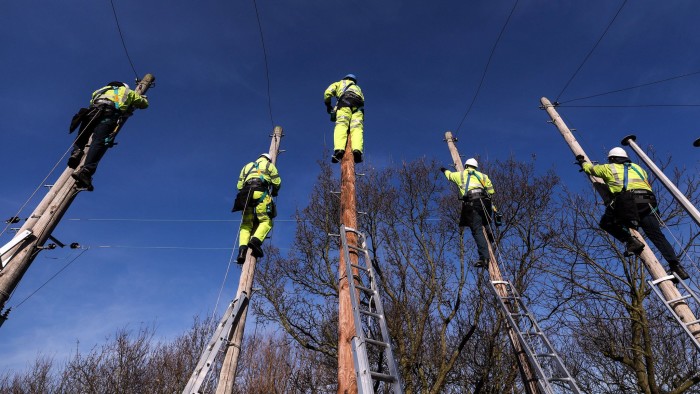Outmoded infrastructure blamed for UK’s productivity slowdown

Roula Khalaf, Editor of the FT, selects her favourite stories in this weekly newsletter.
A Tyrannosaurus Rex breaks out of its enclosure and snatches a park ranger from the ground. Panic ensues and soon a rapid response helicopter is deployed. “Control, we have eyes on the asset.”
The filmmakers at Lancashire-based RealtimeUK, creator of this animated trailer for the forthcoming computer game Jurassic World Evolution, used to have difficulty taking on such complex projects.
Until a few years ago, RealtimeUK was hampered by its inadequate broadband connection, meaning that uploading and downloading files could take hours. After a six-year wait, a much faster fibre connection was installed by provider Virgin Media in 2015.
“Our business has been transformed both in terms of the volume and complexity of productions we’ve been able to take on, and the boost to our profitability,” says RealtimeUK’s founder and managing director Tony Prosser. Now it competes with the world’s biggest studios.
Improvements to the country’s digital and physical network are top priorities for UK business leaders, while the government’s industrial strategy enshrines infrastructure as one of five foundations for improving productivity. RealtimeUK is a useful example of what businesses stand to gain.
Now the company is able to share “mind-bogglingly” large digital files and receive live feedback from clients, says Mr Prosser. The improved efficiency means output per team member has increased by about 20 per cent, at a time when its headcount has grown from 25 to 35.

Policymakers believe infrastructure improvements are vital to improving the UK’s poor productivity performance. It is seen as an enabling factor: fast broadband and good road and air links do not necessarily make a business successful and productive, but it is hard to be so without them.
More than £460bn of projects sit in the government’s infrastructure and construction pipeline, from broadband connections to high-speed rail, power stations and wind farms. Almost half of the investment over the next few years is expected to come from the private sector, especially in regulated areas such as energy, water and telecoms.
That is an ambitious target, particularly amid heightened controversy over private sector involvement in public services. Carillion, the construction company, collapsed in part because of project delays in three substantial UK public-private partnerships. Big infrastructure schemes, such as a long-debated third runway for London’s Heathrow airport, are often contentious.
Few doubt the need to renew Britain’s infrastructure. Since the 1980s, the UK has spent less on infrastructure than the US, France, Canada and Switzerland, according to research by the OECD, the club of wealthy nations.
According to McKinsey Global Institute, Britain needs to spend an extra 0.4 per cent of gross domestic product a year until 2030 to meet its needs. It spent 2.2 per cent of GDP annually between 2008 and 2013 — below Japan, Canada, Italy and the US, but slightly ahead of France and Germany.
Businesses are pushing for improvements. In a recent survey by the CBI employers’ group, two-thirds of companies cited faster and more reliable digital connections as their top business priority.
The government says 95 per cent of homes and businesses now have access to “superfast” speeds of 24 megabits per second or more, but not all are benefiting.
Sue Allen, who runs a dog-friendly holiday homes business in Norfolk, struggles with broadband speeds that do not go much beyond 3.5 mbps. “It’s frustratingly slow at times,” she says. “I don’t think it really affects my profitability, but it does affect my work efficiency.” Sometimes she has to go to a local café to work.
The telecoms regulator Ofcom said in December that only 3 per cent of premises could connect to full fibre broadband, capable of delivering speeds of 1 gigabit per second — far behind countries such as Spain and Portugal.
The precise link between infrastructure and corporate productivity is hard to measure. The Bank of England has identified a “long tail” of less productive businesses, but bad management and failure to spread best practice could be to blame, rather than lack of connectivity.
“Infrastructure is one piece of the puzzle. It’s the facilitator, but investing in infrastructure alone won’t solve the problem,” says Tej Parikh, senior economist at the Institute of Directors. He argues that higher costs, economic uncertainty and difficulty accessing finance are holding companies back from making the necessary investments. However, Mr Parikh adds: “Improvements to roads, rail and air infrastructure are critical in the sense that it helps to develop the connectivity and networks that businesses require.”
Investment in digital (43 per cent) and physical infrastructure (38 per cent) were business’s top demands of politicians, according to a survey of 700 members of the Institute of Directors.
But they also acknowledged that companies needed to make better use of technology, improve organisational efficiency and boost skills and training.
Amit Kara, head of UK macroeconomics research at the National Institute of Economic and Social Research, says: “At the broadest level there is no argument about reinvesting in broadband and other technology. You need to run just to stand still.”

Comments